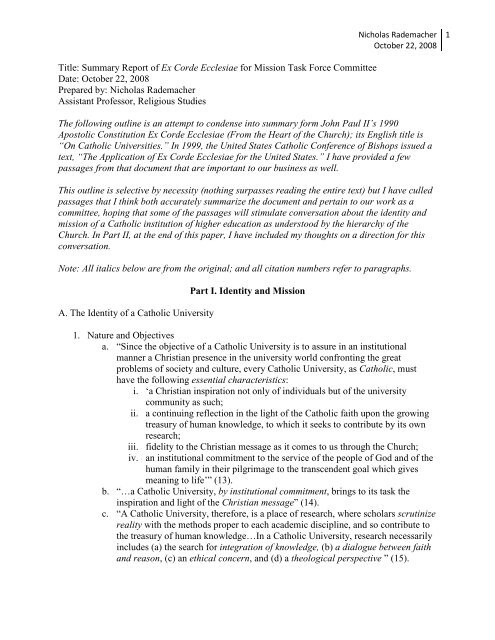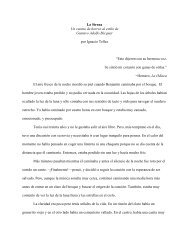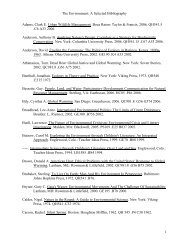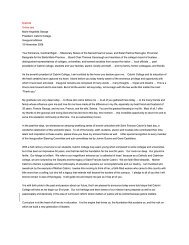N. Rademacher's Summary of Ex Corde - Cabrini College
N. Rademacher's Summary of Ex Corde - Cabrini College
N. Rademacher's Summary of Ex Corde - Cabrini College
Create successful ePaper yourself
Turn your PDF publications into a flip-book with our unique Google optimized e-Paper software.
Nicholas RademacherOctober 22, 20081Title: <strong>Summary</strong> Report <strong>of</strong> <strong>Ex</strong> <strong>Corde</strong> Ecclesiae for Mission Task Force CommitteeDate: October 22, 2008Prepared by: Nicholas RademacherAssistant Pr<strong>of</strong>essor, Religious StudiesThe following outline is an attempt to condense into summary form John Paul II’s 1990Apostolic Constitution <strong>Ex</strong> <strong>Corde</strong> Ecclesiae (From the Heart <strong>of</strong> the Church); its English title is“On Catholic Universities.” In 1999, the United States Catholic Conference <strong>of</strong> Bishops issued atext, “The Application <strong>of</strong> <strong>Ex</strong> <strong>Corde</strong> Ecclesiae for the United States.” I have provided a fewpassages from that document that are important to our business as well.This outline is selective by necessity (nothing surpasses reading the entire text) but I have culledpassages that I think both accurately summarize the document and pertain to our work as acommittee, hoping that some <strong>of</strong> the passages will stimulate conversation about the identity andmission <strong>of</strong> a Catholic institution <strong>of</strong> higher education as understood by the hierarchy <strong>of</strong> theChurch. In Part II, at the end <strong>of</strong> this paper, I have included my thoughts on a direction for thisconversation.Note: All italics below are from the original; and all citation numbers refer to paragraphs.A. The Identity <strong>of</strong> a Catholic UniversityPart I. Identity and Mission1. Nature and Objectivesa. “Since the objective <strong>of</strong> a Catholic University is to assure in an institutionalmanner a Christian presence in the university world confronting the greatproblems <strong>of</strong> society and culture, every Catholic University, as Catholic, musthave the following essential characteristics:i. ‘a Christian inspiration not only <strong>of</strong> individuals but <strong>of</strong> the universitycommunity as such;ii. a continuing reflection in the light <strong>of</strong> the Catholic faith upon the growingtreasury <strong>of</strong> human knowledge, to which it seeks to contribute by its ownresearch;iii. fidelity to the Christian message as it comes to us through the Church;iv. an institutional commitment to the service <strong>of</strong> the people <strong>of</strong> God and <strong>of</strong> thehuman family in their pilgrimage to the transcendent goal which givesmeaning to life’” (13).b. “…a Catholic University, by institutional commitment, brings to its task theinspiration and light <strong>of</strong> the Christian message” (14).c. “A Catholic University, therefore, is a place <strong>of</strong> research, where scholars scrutinizereality with the methods proper to each academic discipline, and so contribute tothe treasury <strong>of</strong> human knowledge…In a Catholic University, research necessarilyincludes (a) the search for integration <strong>of</strong> knowledge, (b) a dialogue between faithand reason, (c) an ethical concern, and (d) a theological perspective ” (15).
Nicholas RademacherOctober 22, 20082i. Integration <strong>of</strong> knowledge…beyond “rigid compartmentalization <strong>of</strong>knowledge within individual academic disciplines … ‘work towards ahigher synthesis <strong>of</strong> knowledge’…engaged in a constant effort to determinethe relative place and meaning <strong>of</strong> the various disciplines within the context<strong>of</strong> a vision <strong>of</strong> the human person and the world that is enlightened by theGospel, and therefore by a faith in Christ, the Logos, as the centre <strong>of</strong>creation and <strong>of</strong> human history” (16).ii. “promote a dialogue between faith and reason, so that it can be seen morepr<strong>of</strong>oundly how faith and reason bear harmonious witness to the unity <strong>of</strong>all truth” (17).iii. “…research in a Catholic University is always carried out with a concernfor the ethical and moral implications both <strong>of</strong> its methods and itsdiscoveries” (18).iv. Theology plays a particularly important role in the search for a synthesis <strong>of</strong>all knowledge as well as in the dialogue between faith and reason” (19).d. Key words from paragraph 20: interdisciplinary studies; human reason in itsreflection…faith; moral implications; Gospel principles.2. The University Communitya. “A Catholic University pursues its objectives through its formation <strong>of</strong> anauthentic human community animated by the spirit <strong>of</strong> Christ. The source <strong>of</strong> itsunity springs from a common dedication to the truth, a common vision <strong>of</strong> thedignity <strong>of</strong> the human person and, ultimately, the person and message <strong>of</strong> Christwhich gives the Institution its distinctive character” (21).b. Discussion <strong>of</strong> university teachers; students; directors and administrators and nonacademicstaff (22-24).3. The Catholic University in the Churcha. “One consequence <strong>of</strong> its essential relationship to the Church is that theinstitutional fidelity <strong>of</strong> the University to the Christian message includes arecognition <strong>of</strong> and adherence to the teaching authority <strong>of</strong> the Church in matters <strong>of</strong>faith and morals. Catholic members <strong>of</strong> the university community are also called toa personal fidelity to the Church with all that this implies. Non-Catholic membersare required to respect the Catholic character <strong>of</strong> the University, while theUniversity in turn respects their religious liberty” (27).b. Role <strong>of</strong> bishops (28).c. “The Church…recognizes the academic freedom <strong>of</strong> scholars in each discipline inaccordance with its own principles and proper methods, and within the confines<strong>of</strong> the truth and the common good” (29).B. The Mission <strong>of</strong> Service <strong>of</strong> a Catholic University1. Service <strong>of</strong> Church to Societya. “called on to become an ever more effective instrument <strong>of</strong> cultural progress forindividuals as well as society…study[ing] serious contemporary problems…[and]speak[ing] uncomfortable truths which do not please public opinion, but whichare necessary to safeguard the authentic good <strong>of</strong> society” (31-32).
Nicholas RademacherOctober 22, 20083b. “examine and evaluate the predominant values and norms <strong>of</strong> modern society froma Christian perspective, and the responsibility to try to communicate to societythose ethical and religious principles which give full meaning to human life” (33).c. “promotion <strong>of</strong> social justice…shared by its teachers and developed in itsstudents”… “The Gospel, interpreted in the social teachings <strong>of</strong> the Church, is anurgent call to promote ‘to promote the development <strong>of</strong> emerging nations’”… andto make education accessible for the poor or minority groups otherwise deniedaccess. (34).d. Interdisciplinary research projects (35).e. “development, <strong>of</strong> understanding between cultures, and <strong>of</strong> the defence <strong>of</strong> nature inaccord with an awareness <strong>of</strong> the international ecological situation” (37).2. Pastoral Ministrya. Pastoral ministry makes it possible for university members to “integrate religiousand moral principles with their academic study and non-academic activities, thusintegrating faith with life” (38)…<strong>Ex</strong> <strong>Corde</strong> calls it “a constitutive element <strong>of</strong> aCatholic University itself.”b. “…the university community should give a practical demonstration <strong>of</strong> its faith inits daily activity with important moments <strong>of</strong> reflection and <strong>of</strong> prayer” (39).3. Cultural Dialoguea. “…a Catholic University, aware that human culture is open to Revelation andtranscendence, is also a primary and privileged place for a fruitful dialoguebetween the Gospel and culture” (43).b. “A Catholic University must become more attentive to the cultures <strong>of</strong> the world <strong>of</strong>today, and to the various cultural traditions existing within the Church in a waythat will promote a continuous dialogue between the Gospel and modern society”(45).c. “…dialogue between Christian thought and the modern sciences” (46).d. Ecumenical and inter-religious dialogue (47).4. Evangelizationa. “By its very nature, each Catholic University makes an important contribution tothe Church’s work <strong>of</strong> evangelization. It is a living institutional witness to Christand his message, so vitally important in cultures marked by secularism, or whereChrist and his message are virtually unknown” (49).Part II General NormsArticle 2, §2 “A Catholic University, as Catholic, informs and carries out its research, teaching,and all other activities with Catholic ideals, principles and attitudes. It is linked with the Churcheither by a formal, constitutive and statutory bond or by reason <strong>of</strong> an institutional commitmentmade by those responsible for it.”Article 4, §4 “Those university teachers and administrators who belong to other Churches,ecclesial communities, or religions, as well as those who pr<strong>of</strong>ess no religious belief, and also allstudents, are to recognize and respect the distinctive Catholic identity <strong>of</strong> the University.”
Nicholas RademacherOctober 22, 20084The Application <strong>of</strong> <strong>Ex</strong> <strong>Corde</strong> Ecclesiae for the United StatesArt. 2 The Nature <strong>of</strong> a Catholic University- “Academic freedom is an essential component <strong>of</strong> a Catholic university.” (Part 2, Art. 2,Par. 2)- “Recognizing the dignity <strong>of</strong> the human person, a Catholic university, in promoting itsown Catholic identity and fostering Catholic teaching and discipline, must respect thereligious liberty <strong>of</strong> every individual, a right with which each is endowed by nature” (Part2, Art. 2, Par. 4).- “A responsibility <strong>of</strong> every Catholic university to affirm its essential characteristics, inaccord with the principles <strong>of</strong> <strong>Ex</strong> corde Ecclesiae, through public acknowledgement in itsmission statement and/or its other <strong>of</strong>ficial documentation <strong>of</strong> its canonical status and itscommitment to the practical implications <strong>of</strong> its Catholic identity, including but notlimited to those specified in Part One, Section 7 <strong>of</strong> this document.” See attached, PartOne, Section 7.I. <strong>Summary</strong> CommentsThe following key terms or phrases stand out to me as representative <strong>of</strong> what <strong>Ex</strong> <strong>Corde</strong> iscommunicating.According to my reading, dialogue is one <strong>of</strong> the most important recurring terms. I would suggestthat it might serve as a controlling metaphor for our purposes. We see reference to:- “a dialogue between faith and reason” (15, 17)- “speaking uncomfortable truths” in light <strong>of</strong> “serious contemporary problems” (32)- “fruitful dialogue between the Gospel and culture” (43)- “dialogue between Christian thought and the modern sciences” (46)- “ecumenical and inter-religious dialogue” (47)When we think about a Catholic college or university’s role in the world, then, as dialogical,there are two partners. Drawing on the examples above: faith (here understood from within thecontext <strong>of</strong> the teaching <strong>of</strong> the Catholic Church), Gospel, Christian thought, Catholic socialteaching, etc. is in conversation with reason, culture, modern science, other faith and religioustraditions, contemporary social problems, etc.As both <strong>Ex</strong> <strong>Corde</strong> and the U.S. “Application” make plain, this dialogue is to be mutuallyrespectful <strong>of</strong> academic freedom and the religious liberty <strong>of</strong> all parties involved, on the one hand,and the integrity <strong>of</strong> the institution’s Catholic identity and mission, on the other.One fundamental challenge [among others] <strong>of</strong> constructing a mission statement for a Catholiccollege or university, then, is: How to be explicit about the college’s role as “Catholic” in thisdialogue with the modern world. Deliberate dialogue requires involved parties to be open andhonest about their identity; both when it comes to engaging the outside world and in speakinginternally about who and what the college is about.






